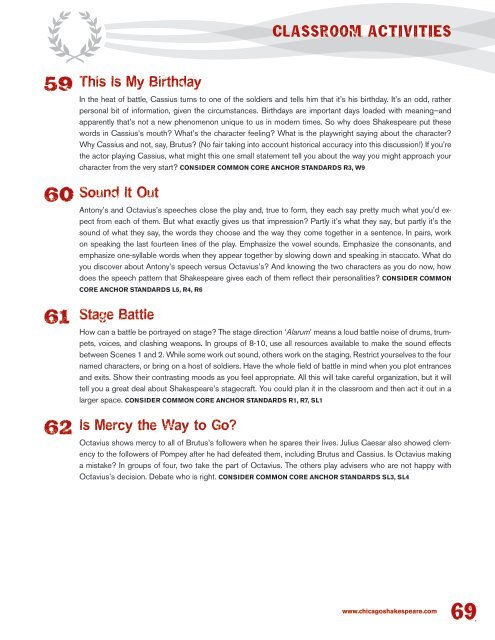Julius Caesar • 2013 - Chicago Shakespeare Theater
Julius Caesar • 2013 - Chicago Shakespeare Theater
Julius Caesar • 2013 - Chicago Shakespeare Theater
Create successful ePaper yourself
Turn your PDF publications into a flip-book with our unique Google optimized e-Paper software.
59<br />
60<br />
61<br />
62<br />
This Is My Birthday<br />
CLASSROOM ACTIVITIES<br />
In the heat of battle, Cassius turns to one of the soldiers and tells him that it’s his birthday. It’s an odd, rather<br />
personal bit of information, given the circumstances. Birthdays are important days loaded with meaning—and<br />
apparently that’s not a new phenomenon unique to us in modern times. So why does <strong>Shakespeare</strong> put these<br />
words in Cassius’s mouth? What’s the character feeling? What is the playwright saying about the character?<br />
Why Cassius and not, say, Brutus? (No fair taking into account historical accuracy into this discussion!) If you’re<br />
the actor playing Cassius, what might this one small statement tell you about the way you might approach your<br />
character from the very start? CONSIDER COMMON CORE ANCHOR STANDARDS R3, W9<br />
Sound It Out<br />
Antony’s and Octavius’s speeches close the play and, true to form, they each say pretty much what you’d expect<br />
from each of them. But what exactly gives us that impression? Partly it’s what they say, but partly it’s the<br />
sound of what they say, the words they choose and the way they come together in a sentence. In pairs, work<br />
on speaking the last fourteen lines of the play. Emphasize the vowel sounds. Emphasize the consonants, and<br />
emphasize one-syllable words when they appear together by slowing down and speaking in staccato. What do<br />
you discover about Antony’s speech versus Octavius’s? And knowing the two characters as you do now, how<br />
does the speech pattern that <strong>Shakespeare</strong> gives each of them reflect their personalities? CONSIDER COMMON<br />
CORE ANCHOR STANDARDS L5, R4, R6<br />
Stage Battle<br />
How can a battle be portrayed on stage? The stage direction ‘Alarum’ means a loud battle noise of drums, trumpets,<br />
voices, and clashing weapons. In groups of 8-10, use all resources available to make the sound effects<br />
between Scenes 1 and 2. While some work out sound, others work on the staging. Restrict yourselves to the four<br />
named characters, or bring on a host of soldiers. Have the whole field of battle in mind when you plot entrances<br />
and exits. Show their contrasting moods as you feel appropriate. All this will take careful organization, but it will<br />
tell you a great deal about <strong>Shakespeare</strong>’s stagecraft. You could plan it in the classroom and then act it out in a<br />
larger space. CONSIDER COMMON CORE ANCHOR STANDARDS R1, R7, SL1<br />
Is Mercy the Way to Go?<br />
Octavius shows mercy to all of Brutus’s followers when he spares their lives. <strong>Julius</strong> <strong>Caesar</strong> also showed clemency<br />
to the followers of Pompey after he had defeated them, including Brutus and Cassius. Is Octavius making<br />
a mistake? In groups of four, two take the part of Octavius. The others play advisers who are not happy with<br />
Octavius’s decision. Debate who is right. CONSIDER COMMON CORE ANCHOR STANDARDS SL3, SL4<br />
www chicagoshakespeare com 69




